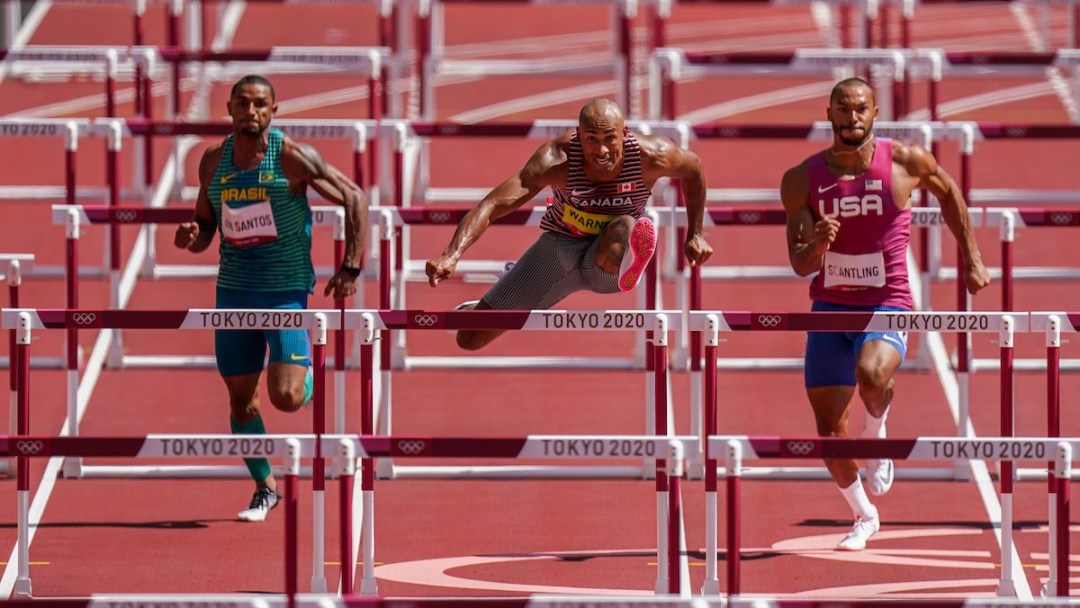The Road to Impossible: Damian Warner on Canada’s ascendence in athletics and the journey to Paris 2024
Most Canadians know Damian Warner as the reigning Olympic champion in the decathlon. This accomplishment is associated with the unofficial title of “world’s greatest athlete” due to the versatility and overall athleticism required to succeed in all 10 events of the decathlon: 100m, long jump, shot put, high jump, 400m, 110m hurdles, discus, pole vault, javelin and 1500m.
Warner has been the standard-bearer, not only for the country at the Closing Ceremony of Tokyo 2020, but for the sport of decathlon within Canada. He first made waves with a surprise fifth-place finish at the London 2012 Olympic Games, after entering the meet ranked 20th. Warner moved up to the bronze medal position at Rio 2016, and then, of course, the Tokyo 2020 gold.
Getting on track
Oftentimes when athletes are standouts in their field (and in Warner’s case, in both track and field), one assumes that they started focusing on their sport at an early age and likely competed at the collegiate level. Such is not the case for Warner, who only got his start in track and field in grade eleven, when his football and basketball coaches saw that he had potential. Warner openly admits that track and field was something that helped him get back on track as a student as well.
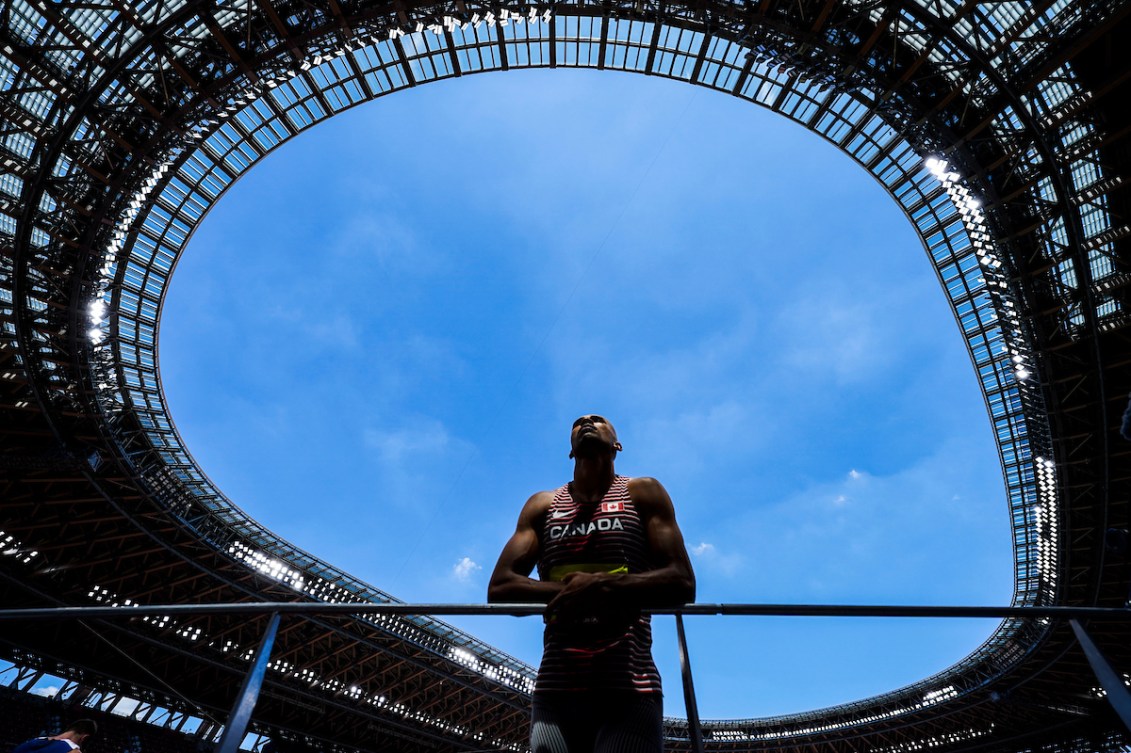
“I didn’t understand the importance of school when I was in high school. I skipped school a lot and because of that my grades suffered. That, combined with the fact that I started track and field late, I didn’t have some of the same opportunities to get into a Canadian school or go to the [United] States on a scholarship,” Warner says.
But his coaches were positive that if he focused his energy, he could be great.
“My track coaches, who were also my high school teachers, brought me into their classroom and said, ‘There’s this thing called the decathlon and we think you could be really good at it’,” Warner explains. “Long story short, I said yes and then went off to the library to research as much as I could about what the decathlon was.”
Keep your friends close
Not only were those coaches absolutely correct that Warner could, in fact, be really good at the decathlon–they’ve been along for the whole journey to see it happen. To this day, Warner works with the same group of coaches that first fostered his talent in high school, including Gar Leyshun, Dennis Nielsen, Vicki Croley, and Dave Collins. It’s highly unusual for an athlete to maintain the same coaches throughout an entire career, from high school through to the top of the Olympic podium.
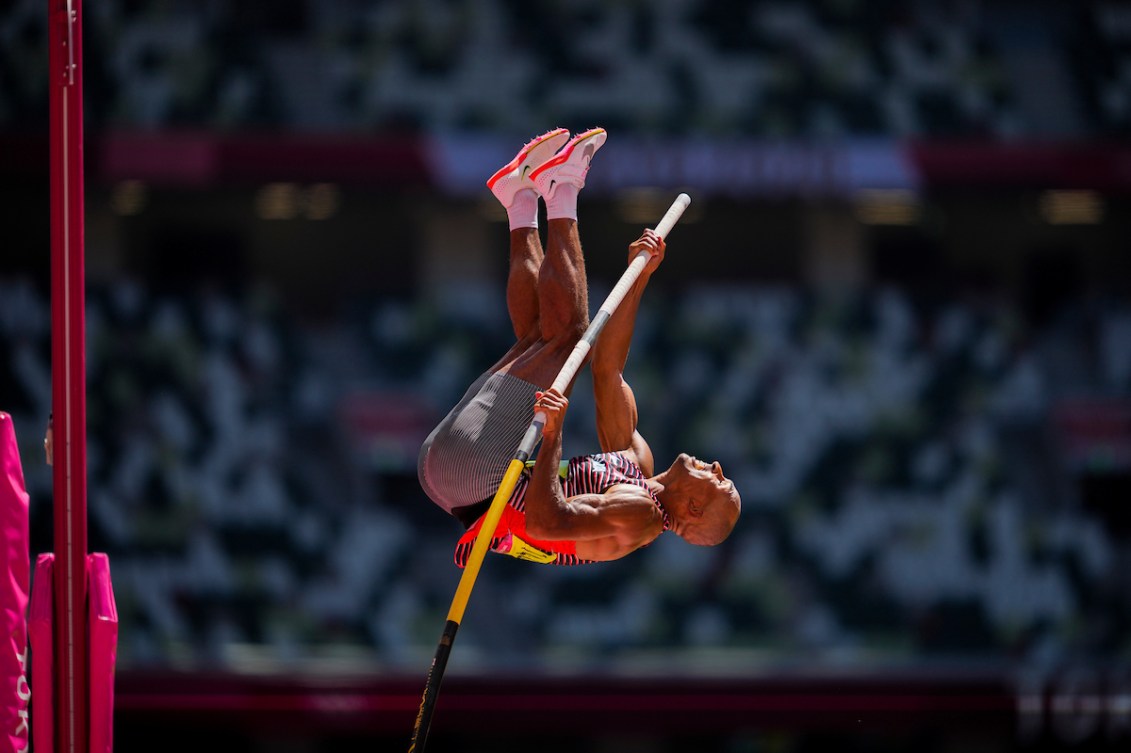
“It’s one of the things that I’m most proud of,” Warner says. “It’s often a natural progression in sport that you work with someone to develop and then once you get to a certain level, you start working with professional coaches. A lot of people along the way have told me that staying with my high school coaches is not going to work out. But there’s nothing like standing on top of the podium and proving them wrong, proving that I was right to bet on the relationships I’ve developed.”
In addition to his long-term coaching squad, Warner’s support team includes his wife, Jen Cotten, who is also an accomplished multi-event athlete, and his entire extended family. In 2021, Warner’s team added its littlest supporter, when Cotten and Warner welcomed their son, Theo. Warner says that becoming a dad has compelled him to bring a bit more balance into his life and training.
“In the past, so much of my focus went towards track and field. Jen would joke that even when I’m in the aisles of the grocery store, I’m still practicing my discus throw. Track and field was just always on my mind–and I enjoyed that,” Warner says. “But I didn’t give myself much time to step away from that. And now when I come home, and Theo’s right out the door and wants to play basketball or hockey, I can step back and focus on him. I think it’s taught me that I don’t have to be obsessive to perform well. And I think that was really important for me.”
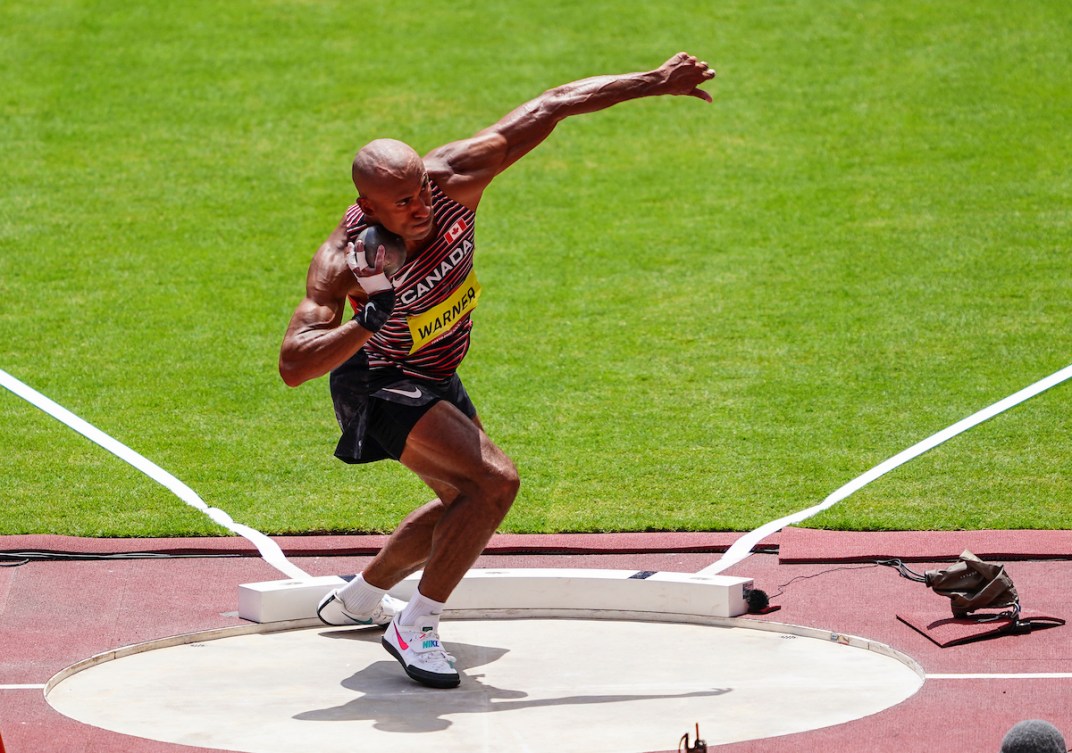
Growing the sport
It’s not just Theo that Warner has watched grow over the years.
“When I first started making the team, people were talking about getting top 12 and how lucky that would be. Now people are talking about medals,” Warner says.
“The perspective in Canadian track and field has changed. And I lend a lot of that to Derek Drouin. To me, he’s the guy that kind of set everything in motion. He went to the Olympics as a young guy and won a medal and everyone else started thinking–why not me? He spearheaded and then a lot of us followed: Shawnacy Barber, Brianne Theisen-Eaton, Andre De Grasse and myself, we kept the wheels in motion.”
READ: Team Canada Olympians on their favourite moment as Team Canada fans
Not only has the landscape of track and field changed, but there’s also been huge growth in the discipline of decathlon, led by Warner’s success. At the most recent World Athletics Championships in 2023, teammate Pierce LePage and Warner won gold and silver, respectively, demonstrating a decathlon dominance the nation has never seen.
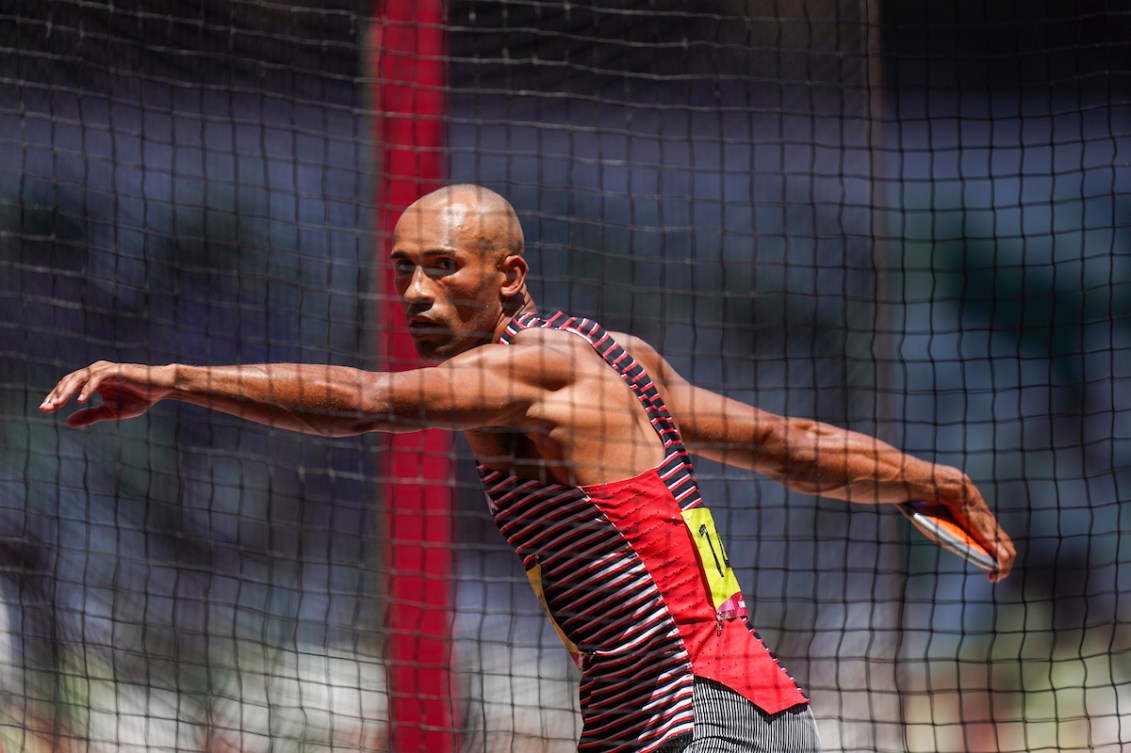
That’s a far cry from Warner’s early days, when people would sometimes mix up the decathlon with the modern pentathlon: “Oh, you’re that guy that does the swimming and the horseback riding and all the other stuff?” he recalls with a laugh.
Warner gives some credit for the nation’s increased decathlon knowledge to a Team Canada teammate, race walker Evan Dunfee, who Warner calls “Canadian decathlon’s biggest supporter.” Dunfee developed a tradition of live tweeting during the competitions to offer explainers on the decathlon and demystify the points system for fellow Team Canada athletes and fans.
It’s inarguable that a significant portion of the growth can be attributed to Warner himself.
“I remember the first Canadian championships that I went to in 2010. There were four guys that finished that decathlon,” Warner says. “Fast forward to this past year and 50 guys finished the decathlon. It was an unprecedented number of people…and I like to think I had some kind of effect on that.”
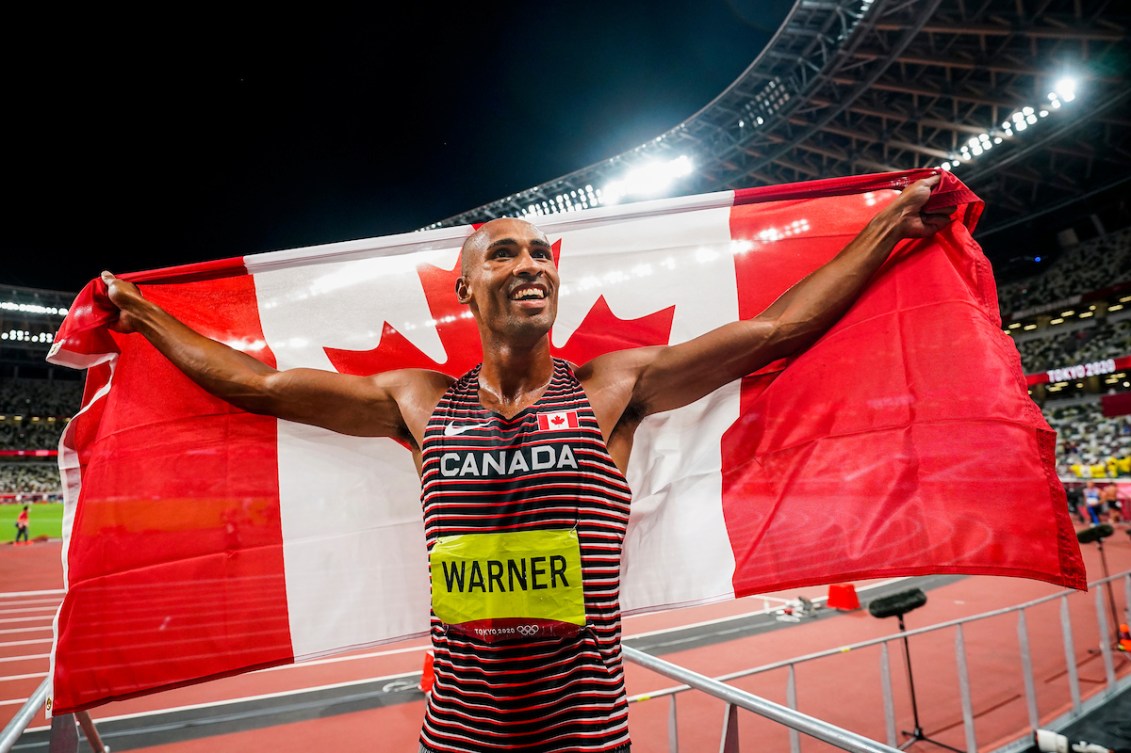
Rapid Fire with Damian Warner
If you weren’t a decathlete, what sport would you do?
DW: Hmmm. I think football.
Any pre-race routines or superstitions?
DW: The only thing I do is cut my hair…though that has created issues for me in the past! In London before the Olympics, I was cutting my hair and halfway through my clippers died. I was in a big panic trying to find a pair of clippers that could cut the rest of my hair. Now I’ve got some wireless clippers, but that’s the only thing that I do. I guess you could call it a superstition.
Do you have a favorite Olympic memory as a Team Canada fan or spectator?
DW: In 2012, I went into the Olympics ranked 20th, but I did well enough to finish fifth overall. Afterwards I went to Canada Olympic House, and they were doing a celebration for athletes that won medals. And that was the day that Derek Drouin was there with his medal, and he got up and spoke with his coach.
To me that was like a really cool thing, because he was someone that I looked up to and to see him do it…I think that was a shift for me to be like: I want to do that too. I want to be able to get up there and I want to be able to win a medal and hear the Canadian National anthem. So, I think that was one of the coolest memories for me and I think it shaped a lot of where I am today.
And final question, what are you most looking forward to on the road to Paris 2024?
DW: Just the journey! I’m trying to learn as much as I can and put myself in a position to succeed and I’m just going to go out there and give it my all. I think that’s all I’ve ever done and that’s all I could ever ask myself to do–just to be my best and my best will lead me wherever it leads me.
Warner and several other athletes are part of Team Toyota – a roster of Canadian athletes on the road to the Olympic and Paralympic Games Paris 2024.These athletes share Toyota’s belief in the power of human movement to help overcome barriers, and are sharing their stories to help inspire a future generation of Olympians, Paralympians and Canadians.

